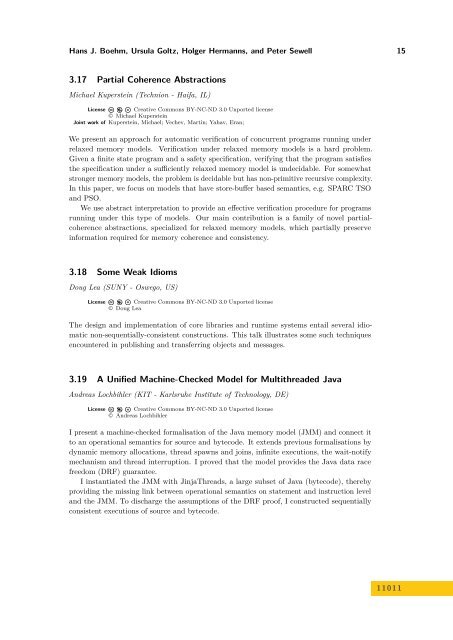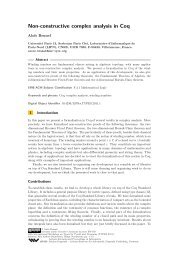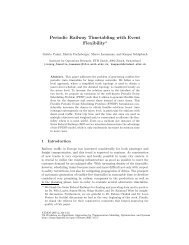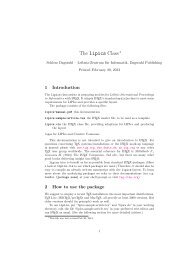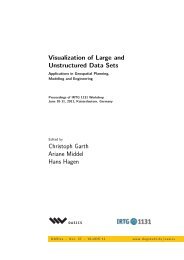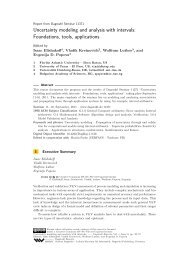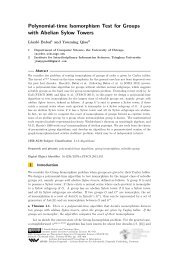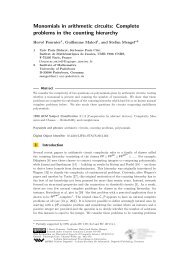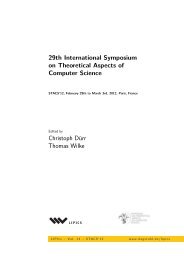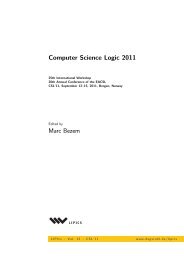Volume 1, Issue 1, January 2011 - DROPS - Schloss Dagstuhl
Volume 1, Issue 1, January 2011 - DROPS - Schloss Dagstuhl
Volume 1, Issue 1, January 2011 - DROPS - Schloss Dagstuhl
You also want an ePaper? Increase the reach of your titles
YUMPU automatically turns print PDFs into web optimized ePapers that Google loves.
Hans J. Boehm, Ursula Goltz, Holger Hermanns, and Peter Sewell 15<br />
3.17 Partial Coherence Abstractions<br />
Michael Kuperstein (Technion - Haifa, IL)<br />
License Creative Commons BY-NC-ND 3.0 Unported license<br />
© Michael Kuperstein<br />
Joint work of Kuperstein, Michael; Vechev, Martin; Yahav, Eran;<br />
We present an approach for automatic verification of concurrent programs running under<br />
relaxed memory models. Verification under relaxed memory models is a hard problem.<br />
Given a finite state program and a safety specification, verifying that the program satisfies<br />
the specification under a sufficiently relaxed memory model is undecidable. For somewhat<br />
stronger memory models, the problem is decidable but has non-primitive recursive complexity.<br />
In this paper, we focus on models that have store-buffer based semantics, e.g. SPARC TSO<br />
and PSO.<br />
We use abstract interpretation to provide an effective verification procedure for programs<br />
running under this type of models. Our main contribution is a family of novel partialcoherence<br />
abstractions, specialized for relaxed memory models, which partially preserve<br />
information required for memory coherence and consistency.<br />
3.18 Some Weak Idioms<br />
Doug Lea (SUNY - Oswego, US)<br />
License Creative Commons BY-NC-ND 3.0 Unported license<br />
© Doug Lea<br />
The design and implementation of core libraries and runtime systems entail several idiomatic<br />
non-sequentially-consistent constructions. This talk illustrates some such techniques<br />
encountered in publishing and transferring objects and messages.<br />
3.19 A Unified Machine-Checked Model for Multithreaded Java<br />
Andreas Lochbihler (KIT - Karlsruhe Institute of Technology, DE)<br />
License Creative Commons BY-NC-ND 3.0 Unported license<br />
© Andreas Lochbihler<br />
I present a machine-checked formalisation of the Java memory model (JMM) and connect it<br />
to an operational semantics for source and bytecode. It extends previous formalisations by<br />
dynamic memory allocations, thread spawns and joins, infinite executions, the wait-notify<br />
mechanism and thread interruption. I proved that the model provides the Java data race<br />
freedom (DRF) guarantee.<br />
I instantiated the JMM with JinjaThreads, a large subset of Java (bytecode), thereby<br />
providing the missing link between operational semantics on statement and instruction level<br />
and the JMM. To discharge the assumptions of the DRF proof, I constructed sequentially<br />
consistent executions of source and bytecode.<br />
1 1 0 1 1


